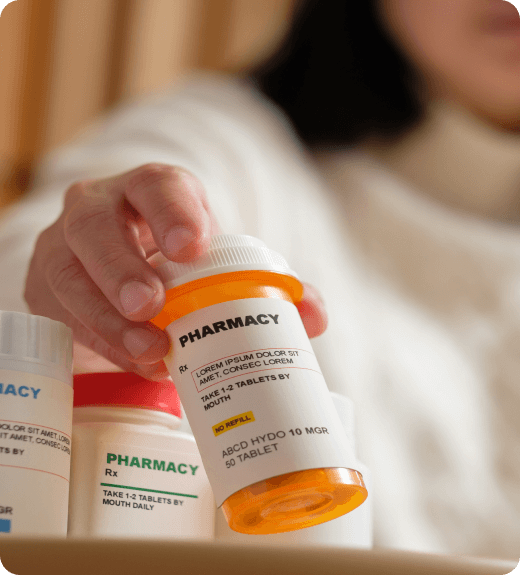
What Is Prescription Drug Addiction?
Prescription drug addiction is a pervasive issue affecting individuals across various demographics, often starting innocuously with legitimate medical needs but spiraling into dependency and misuse. Understanding the signs and symptoms of prescription drug abuse is crucial to intervening early and preventing further harm.
Who Is at Risk of Addiction?
Addiction to prescription painkillers is a growing concern, with significant risks associated with their use. According to the FDA, between 21% and 29% of individuals who are legally prescribed painkillers are at risk of developing an addiction. Alarmingly, about 10% of those who misuse prescription opioids may eventually turn to more dangerous substances like heroin. Although not everyone who uses prescription painkillers will become addicted, the potential for dependency is substantial. Prescription drug addiction is a complex issue that can impact anyone, regardless of their background or lifestyle.
Several factors can increase the likelihood of addiction. While no one anticipates needing powerful medications like hydrocodone, the psychological pull of these drugs can be strong and challenging to resist. Individuals with a personal or family history of substance abuse, those with mental health issues such as anxiety or depression, and people who have experienced traumatic events are at a higher risk. Additionally, those who use prescription painkillers outside of medical guidelines or for non-medical reasons are more vulnerable to developing a dependency.
Preventing addiction starts with setting clear boundaries and adhering to prescribed guidelines. Engaging in an active treatment plan with your physician and maintaining accountability with friends or family can significantly reduce the risk of misuse. If you or someone you care about is already struggling with addiction, it’s important to seek help immediately. It’s never too late to reach out for support and explore treatment options.
Understanding the risks and effects of prescription medications is crucial in preventing addiction. By educating yourself about how these drugs can lead to dependency and recognizing the signs of addiction, you can make informed decisions about their use. This awareness also helps in identifying effective treatments and support systems available to those in need. The landscape of addiction treatment is continually evolving, with medically supervised detoxification becoming safer and more accessible than ever before.
Role of Mental Health in Prescription Drug Addiction
Co-occurring mental health disorders frequently accompany prescription drug addiction, complicating treatment and recovery. Conditions such as depression, anxiety, and trauma can drive individuals to seek solace in medications, exacerbating dependency. Integrated treatment that addresses both substance use and underlying mental health issues is essential for comprehensive recovery.
Initiation of Prescription Drug Addiction
Most individuals start using prescription drugs under medical supervision for legitimate reasons like pain management or mental health treatment. However, misuse can occur when medications are improperly prescribed, overused, or taken without medical oversight. Over time, tolerance builds, necessitating higher doses to achieve the desired effect and potentially leading to dependency.
Types of Prescription Drugs and Their Risks
Prescription drugs are categorized into several classes, each serving specific medical purposes. However, these medications also carry the potential for abuse and addiction, especially when used improperly. Understanding the different types of prescription drugs and their effects on the body is crucial in preventing dependency and ensuring they are used safely.
Commonly Abused Prescription Drugs Include
- Opioids/Opiates: Often prescribed for pain management, these drugs are highly addictive. They are used to treat both chronic and acute pain but can lead to serious addiction issues if not used correctly.
- Examples: Oxycodone (OxyContin), Hydrocodone (Vicodin), Morphine, Codeine, Fentanyl
- Benzodiazepines: These medications are typically used to treat anxiety, panic disorders, and sleep disorders. They work by calming the central nervous system but can lead to dependence and addiction when used long-term or inappropriately.
- Examples: Valium (Diazepam), Xanax (Alprazolam), Ativan (Lorazepam), Klonopin (Clonazepam)
- Barbiturates: Once commonly used for anxiety and sleep disorders, barbiturates have largely been replaced by benzodiazepines due to their high potential for addiction and overdose. They depress the central nervous system and can lead to severe physical dependence.
- Examples: Phenobarbital, Secobarbital
- Stimulants: Prescribed for conditions such as Attention Deficit Hyperactivity Disorder (ADHD) and narcolepsy, stimulants can enhance focus and alertness but are prone to misuse, especially in academic or professional settings.
- Examples: Adderall (Amphetamine/Dextroamphetamine), Ritalin (Methylphenidate), Dexedrine (Dextroamphetamine)
Understanding the Risks:
Each class of prescription drugs has its own risk profile for addiction and misuse. For instance, opioids are known for their high potential for addiction due to their effects on pain and pleasure centers in the brain. On the other hand, benzodiazepines, while effective for anxiety, can lead to dependence when used over long periods. Stimulants, although often prescribed for legitimate medical conditions, are sometimes abused by individuals seeking to improve cognitive performance or stay awake.
Regardless of the type of prescription drug, it is essential to follow the prescribed dosage and use these medications only under the supervision of a licensed healthcare professional. Misuse or overuse of prescription medications, even when initially prescribed for legitimate medical reasons, can lead to serious health issues, including addiction. Being informed about the potential risks and effects of these medications is a critical step in using them responsibly and avoiding dependency.
Symptoms of Prescription Drug Addiction
Prescription drug addiction manifests through a range of physical and psychological symptoms that can significantly impact an individual’s daily life. Often, those struggling with addiction become increasingly secretive, as they attempt to conceal their drug use and the extent of their dependency. This secrecy can lead to withdrawal from personal relationships and neglect of daily responsibilities, such as work, school, or family obligations.
The symptoms of prescription drug addiction can vary based on several factors, including the specific drug used, the level of addiction, and individual differences in susceptibility. However, some common indicators of prescription drug abuse include:

Physical Symptoms
- Fever: Elevated body temperature can occur due to the body’s reaction to drug toxicity or withdrawal.
- Irritability: Frequent mood swings and heightened frustration can arise from the drug’s impact on the central nervous system.
- Confusion: Cognitive impairment and disorientation are common as drug abuse affects brain function.
- Dizziness: A feeling of lightheadedness or vertigo can be a side effect of drug misuse.
- Constipation: Many prescription opioids slow down digestive processes, leading to gastrointestinal issues.
- Breathing Problems: Difficulty in breathing can result from depressant drugs that slow respiratory function.
- Loss of Appetite: Changes in eating habits, including a significant reduction in appetite, are typical.
- Memory Problems: Impaired cognitive function can lead to forgetfulness and difficulty concentrating.
- High Blood Pressure: Some stimulants can elevate blood pressure, increasing the risk of cardiovascular issues.
Behavioral Symptoms
- Lack of Concentration: Difficulty in focusing on tasks and making decisions is common among those struggling with addiction.
- Poor Decision-Making: Compromised judgment and risky choices may occur as drug use affects cognitive function.
- Risky and Unsafe Behaviors: Engaging in dangerous activities, such as driving under the influence or unsafe sexual practices.
- Sleeping Problems: Issues such as insomnia or disrupted sleep patterns are frequently reported.
- Problems with Balance and Coordination: Impaired motor skills can lead to difficulties in physical coordination and stability.
Prescription Drug Withdrawal
Withdrawal from prescription drugs can be an intense and challenging experience. The symptoms of withdrawal can be both physically and psychologically distressing and may vary depending on the substance and duration of use. Quitting abruptly, or “cold turkey,” can exacerbate these symptoms and increase the risk of relapse.
When prescription drugs, particularly opioids, are suddenly discontinued, the body may struggle to adjust. Opioids impact the brain’s dopamine system, which influences pleasure and reward. The sudden drop in dopamine levels can lead to a range of withdrawal symptoms:
- Insomnia: Difficulty falling or staying asleep is common as the body readjusts.
- Irritability: Increased moodiness and frustration are often experienced.
Anxiety: Elevated levels of nervousness or panic can occur due to the absence of the drug. - Nausea and Vomiting: Gastrointestinal distress is a frequent withdrawal symptom.
- Diarrhea: The digestive system often reacts adversely when opioid use is halted.
- Tremors: Shaking or trembling can occur as the body undergoes withdrawal.
- Dehydration: Due to vomiting and diarrhea, dehydration is a concern.
- Depression: Feelings of sadness or hopelessness may intensify without the drug’s effects.
- Hallucinations: Some individuals may experience visual or auditory hallucinations.
- Extreme Sweating: Profuse sweating is a common physical reaction during withdrawal.
- Hot and Cold Flushes: Rapid changes in body temperature can be distressing.
- Changes in Appetite: Either an increase or decrease in appetite may occur.
- Increased Heart Rate and Blood Pressure: Cardiovascular symptoms can become more pronounced.
- Muscle Pain or Cramping: Physical discomfort and cramping are typical as the body detoxifies.
- Poor Concentration and Memory: Cognitive functions may be impaired during withdrawal.
The withdrawal process is a critical phase of recovery, and professional support is crucial.
Integration of Mental Health in Treatment
Effective treatment for prescription drug addiction integrates mental health support to address underlying issues driving substance use. Therapeutic modalities like Cognitive Behavioral Therapy (CBT), Dialectical Behavior Therapy (DBT), and trauma-informed care help individuals manage cravings, develop coping skills, and address co-occurring disorders.
Comprehensive Treatment Approaches
At Silver Linings Recovery Center, we offer tailored treatment programs that encompass:
- Residential/Inpatient Treatment: Intensive, 24/7 care in a supportive environment for structured therapy, skill-building, and relapse prevention.
- Partial Hospitalization Program (PHP): Daytime treatment with structured therapy sessions, ideal for individuals needing intensive support while maintaining some daily routines.
- Intensive Outpatient Program (IOP): Flexible treatment option providing therapy sessions several times a week, accommodating work and family commitments while supporting recovery.
- General Outpatient Program: Customizable treatment plan with regular therapy sessions, suitable for individuals transitioning from higher levels of care or maintaining sobriety.
Finding the Path to Recovery
Prescription drug addiction is a complex condition that requires comprehensive treatment addressing both physical dependency and underlying mental health issues. At Silver Linings Recovery Center, we are committed to providing personalized care, integrating mental health support to promote long-term recovery. If you or someone you know is struggling with prescription drug addiction, contact us to begin the journey to sobriety. Our compassionate team is here to support you every step of the way.